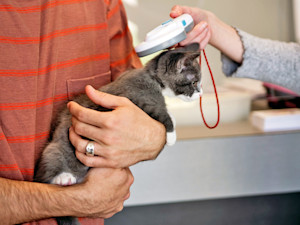Lost For Over A Decade – How Cats Miraculously Manage To Find Their Way Back Home
Cats are famous for turning up again weeks, months and even years after they disappear. But why? And how do they do it?

Share Article
Have you ever had a cat go missing and turn up at random weeks later? It’s not usual for outdoor cats to do this – and there are even stories of cats returning home after years away!
Take Nev, who went missing in May 2022 but turned up outside his family’s homeopens in a new tab in Begbroke, Oxfordshire, in May this year. Or, Westley, who disappeared in June last year but came home on Christmas morningopens in a new tab.

littleKin™ is Kinship’s home just for puppy and kitten parents. Bop over to check out expert advice, new pet tools, and special deals—all curated for your newest family member.
opens in a new tabOr, how about Daisy, who was found a whopping 11 years after she went missingopens in a new tab? She didn’t turn up outside the family home, but was still living in the Caerphilly area and was reunited with her family after being taken to the vet by locals.
There are also cases of cats returning to their old homes after they’ve moved away with their family – sometimes hundreds of miles away. Meanwhile, one cat, in 2013, was found outside a house in Floridaopens in a new tab. She belonged to a family nearby but had gone missing on a trip a couple of months earlier. She had travelled 200 miles back home.
But what makes cats do this, and how do they do it? We’ve spoken to a few experts to find out whether cats have a homing instinct, and why they might go missing.
Tasha Lewis, the founder of Living Thingsopens in a new tab, explains that cats leave their scent around their territory, creating a scent trail that they can follow to help them find their way home. Meanwhile, they also have great navigation skills. “Cats possess an excellent sense of direction and spatial awareness, which helps them navigate their surroundings,” she says, “They also have the ability to use the earth’s geomagnetism(!) as a compass.” Just when you thought you knew your four-legged friend...
Do cats have a homing instinct and how does it work?
“Cats have very well-tuned homing instincts, with some having stronger ones than others,” says Dr Anna Foreman, in-house vet at Everypaw Pet Insuranceopens in a new tab. “They are very territorial animals, and often have a good mental map of their home and the surrounding area based on sight and smell.”
We’ve known about cats’ homing instincts since at least 1922, when Francis H Herrick published the (rather cruel) Homing Powers of the Catopens in a new tab. Herrick tested the homing powers of a cat by moving her to seven different locations between one and three miles away from her home, in which she had a litter of kittens close to weaning age. To each location, she was transported in a gunny sack in a car, and then placed under a wooden box when she got there.
She was able to find her way home, until a final trial, when she was taken 16.5 miles away and did not return home. But in each trial, she seemed to know the correct direction of home straight away.
Back in the rather more ethical present, Dr Foreman explains that a cat’s homing instincts can last over both distances and time periods, so cats who’ve been missing for years can find their way home. “Cats, particularly stray or outdoor ones, often return to locations where they are regularly fed or interacted with. Cats, much like dogs, also have a strong recognition of people – they like to be around those with a familiar scent, and who are generous with treats and attention!” she says.
Daniel Warren-Cummings, a Central Behaviour Officer for Cats Protectionopens in a new tab, says that, while cats can recognise people and places after a length of time has passed, changes in a person’s or an environment’s scent can make it more difficult for a cat to recognise them. “A cat that gets lost and returns home six months later may show a more favourable response to people in the home than a cat that was taken 100 miles from home and re-introduced to people in an unfamiliar context,” he says.
Warren-Cummings also explains that cats are territorial animals who establish a ‘core territory’ and a ‘home range’. The core territory is where the cat feels safest, with access to key resources and rest areas – so usually the home and garden. Meanwhile, the home range is the area beyond the core territory, where a cat may explore.
“When cats are in their core territory or home range, then don’t particularly need a homing instinct,” he says. “It will be an area they know fairly well and can easily navigate through scent, memory and orientation and familiarity with the space.”
It’s when a cat goes missing that their homing instinct is more likely to kick in.
Reasons why cats might go missing for long periods of time
As many cat parents will know, our felines are independent, and can seem to ‘own’ their humans and homes rather than the other way around. “They very much pick their own homes, and if not happy within one, they will often have a scarce presence or leave entirely,” says Dr Foreman.
Big changes, like a new home, or new family members or pets, can make cats stressed. As a result, they might look for quieter, safer places to live. Particularly if you know that your cat is dealing with changes, it’s a good idea to look out for signs of stress. Dr Foreman explains that stress can cause medical issues like cystitis (inflammation of the bladder, usually caused by a bladder infection), skin problems, and over grooming.
Meanwhile, says Lewis, “Cats are highly resourceful and capable of finding food, water and shelter, which helps them survive until they can return home.” They can survive as strays for a long time in many cases.
Warren-Cummings adds, “Some cats, when outside, can be spooked or run into difficulty that means they move away from their home range and core territory and they can become disorientated and struggle to find their way home.”
How to encourage your cat home if they go missing
Nobody wants to think about their cat going missing, but it’s important to know what to do if it ever happens to you – here’s Dr Foreman’s advice.
First of all, try not to panic – as much as it might be easier said than done! Most cats will find their way home. But if your cat comes back and you have any concerns about them, make sure you contact your vet immediately.
To encourage your cat back, get some old clothes with your smell on them and put them outside with a bowl of their food, making the most of your kitty’s supreme sense of smell. As cats have great hearing, too, it’s also worth calling them and shaking packets of food or their favourite treats! According to a 2018 studyopens in a new tab, most cats are found within a 500m radius of their home, or wherever they went missing from, so tapping into their strongest senses and searching the local area thoroughly can really help.
On the practical side of things, get in touch with local vets so they know to contact you if your cat is brought in by a passerby or local resident. Vets will scan for a microchip, so if your details are all up-to-date and accurate, they should be in contact anyway. Notify your cat’s microchip company, too, so they can put an alert on their account. This way, if the chip number is searched, it’ll be flagged that your cat is missing. If your cat hasn’t got a microchip – it’s now the lawopens in a new tab to ensure they have one!
And, if you’re a social media user, don’t forget to post on local social media groups. Add your cat’s picture, name, and last known location. If your cat can be nervous, ask people not to approach them directly but to phone you instead.

Adam England
Adam England is a lifestyle and culture journalist who has written for publications including PetsRadar, Verywell Mind, People and Healthline. When he’s not writing, he might be visiting his parents’ Golden Retriever, looking up cats for adoption, or getting into arguments over music.
Related articles
![a man holds a kitten while a woman scans it for microchip]() opens in a new tab
opens in a new tabCat Microchipping Law: What Happens if You Don’t Comply
Microchipping your cat is quick and painless – and it’s now required by law
![]() opens in a new tab
opens in a new tabHow Cat Tracking Made Me A Better Pet Parent
Finally, the secrets to my cat’s outdoor life have been unlocked
![A woman with curly black hair sitting in front of a dark purple and yellow backdrop while looking down affectionately at her two cats sitting on her lap]() opens in a new tab
opens in a new tab7 Ways to Build Your Cat’s Trust In You
If your cat still approaches you with a figurative arched eyebrow of scepticism, try these tricks to put them at ease
![]() opens in a new tab
opens in a new tabHow Cats Hunt
Cats have evolved to be skilled hunters, but how and why do they still do it?






